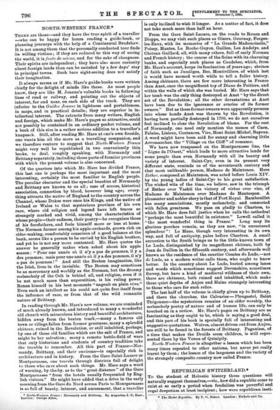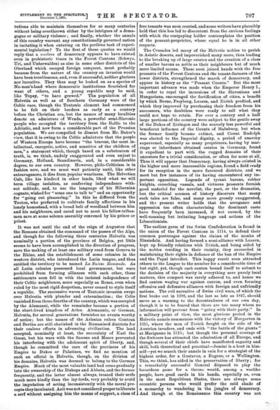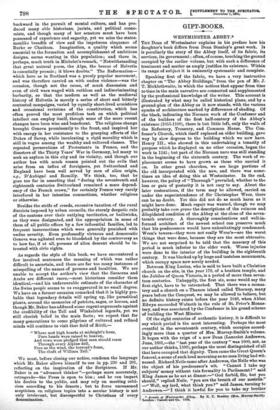REPUBLICAN SWITZERLAND.*
To the student of Helvetic history three questions will naturally suggest themselves,—viz., how did a republic come to exist at so early a period when feudalism was powerful and regal despotism at least incipient ; how were republican insti- • The Model Republic. By r. G. Baker. London : Nichols and Co.
tutions able to maintain themselves for so many centuries without being overthrown either by the intrigues of a dema- gogue or military violence ; and finally, whether the annals of this country warrant any constitutionally governed nation in imitating it when entering on the perilous task of experi- mental legislation? To the first of these queries we would reply that a nucleus of democracy appears to have existed even in prehistoric times in the Forest Cantons (Schwyz, Uri, and TJnterwalden) as also in some other districts of the Oberland which escaped foreign conquest, most probably because from the nature of the country an invasion would have been troublesome, and, even if successful, neither glorious nor lucrative. They thus may be looked on as a species of No-man's-land where democratic institutions flourished for want of others, and a young republic may be said, like Topsy, " to have growed." The population of all Helvetia as well as of Southern Germany were of the Celtic race, though the Teutonic element had commenced to be felt on their borders as early as a century before the Christian era, but the names of many localities denote an admixture of Wends, a powerful semi-Slavonic people who occupied the territory from the Baltic to the Adriatic, and now form a considerable part of the Prussian population. We are compelled to dissent from Mr. Baker's view, that it is owing to its Celtic admixture that the people of Western Europe have become "the bravest, the most in- tellectual, energetic, active, and sensitive of the children of men," a statement which, though based on a substratum of truth, is, we think, unduly exaggerated and even unjust to Germany, Holland, Scandinavia, and, in a considerable degree, to our own country. However, philo-Celticism is in fashion now, and we must wait patiently until, like other extravagances, it dies from popular weariness. The Helvetian Celt, like his kindred in other lands, liked what we will term village isolation, as conferring independence with- out solitude, and, to use the language of his Hibernian cognate, wished for "some one to talk to" and an opportunity for "going out pleasuring." In this he differed from the Teuton, who preferred to cultivate family affections in his lonely homestead, with a broad belt of woodland between him and his neighbours, and oared not to meet his fellow-tribes- men save at some solemn assembly convened by his prince or priest.
It was not until the end of the reign of Augustus that the Romans obtained the command of the passes of the Alps, and though for the following three centuries Helvetia was nominally a portion of the province of Belgica, yet little seems to have been accomplished in the direction of progress, save the making of at least one military road from Geneva to the Rhine, and the establishment of some colonies in the western district, who introduced the Latin tongue, and thus entitled the territory to be named La Suisse Romande. As all Latin colonies possessed local government, but were prohibited from forming alliances with each other, these settlements soon fell in with the isolated independence of their Celtic neighbours, more especially as Rome, even when ruled by the most rigid despotism, never ceased to style itself a republic. The successive waves of Teutonic invasion swept over Helvetia with plunder and extermination ; the Celts vanished from three-fourths of the country, which was occupied by the Alemanni, while the remainder became a portion of the short-lived kingdom of Arles. Alemannic, or German, Helvetia, for several generations furnishes no events worthy of notice; but the names of the Arlesian rulers Gontran and Bertha are still cherished in the Romanised districts for their zealous efforts in advancing civilisation. The land accepted, nominally at least, the suzerainty of Karl the Great, but his wars with the Saxons and Moors prevented his interfering with the adolescent spirit of liberty, and, though he committed the care of the provinces of his Empire to Dukes or Palatines, we find no mention of such an official in Helvetia, though, on the division of his domains, Helvetia was deemed to belong to the German Empire. Much of the most valuable land had come gradually into the ownership of the Bishops and Abbots, and the former frequently, and the latter almost always, treated their serfs much more kindly than the lay-lords, very probably to avoid the imputation of acting inconsistently with the moral pre- cepts they inculcated. As it was not considered proper to liberate a serf without assigning him the means of support, a class of
free tenants was soon created, and some writers have plausibly held that this has led to discontent from the envious feelings with which the rentpaying holder contemplates the position of the peasant-proprietor, whose equal he is in all other respects.
The Crusades led many of the Helvetic nobles to perish in Asiatic deserts, and impoverished many more, thus leading to the breaking up of large estates and the creation of a class of smaller barons as noble as their neighbours but of much more limited means. These soon joined bands with the free peasants of the Forest Cantons and elbe tenant-farmers of the lower districts, strengthened the march of democracy, and appear in history as the "Peasant Counts." But the most important advance was made when the Emperor Henry I., in order to repel the incursions of the Slavonians and Hungarians, encouraged the fortification of cities, a benefit by which Berne, Freyberg, Luzern, and Zurich profited, and which they improved by purchasing their freedom from his successors, who doubtless were ready to sell what they could not hope to retain. For over a century and a half large portions of the country were subject to the gentle sway of the Dukes of Zaringen and the scarcely less powerful and beneficent influence of the Counts of Habsburg, but when the former family became extinct, and Count Rudolph was elected to the Imperial dignity, a period of anarchy supervened, especially as many proprietors, having by mar- riage or inheritance obtained estates in Germany, found it expedient to part with the rugged domains of their ancestors for a trivial consideration, or often for none at all, Thus it will appear that Democracy, having always existed in the higher and more inaccessible regions, found a field ready for its reception in the more favoured districts, and we meet but few instances of its having encountered any im- portant opposition. Legends of tyrant barons, robber knights, crouching vassals, and virtuous peasants furnish good material for the novelist, the poet, or the dramatist, but the critical acumen of history discovers that many such tales are false, and many more grossly exaggerated, and tin present writer holds that the arrogance and oppression too often characterising the dominant caste have frequently been increased, if not caused, by the well-meaning but irritating language and actions of the Liberationists.
The earliest germ of the Swiss Confederation is found in the union of the Forest Cantons in 1114, to defend their common pasturages against the claims of the monks of Einsiedeln. And having formed a semi-alliance with Luzern, kept up friendly relations with Zurich, and being aided by the nobles residing in their vicinity, they succeeded in maintaining their rights in defiance of the ban of the Empire and the Papal interdict. This happy result soon attracted others to the League to the number for a considerable time of but eight, yet, though each canton bound itself to submit to the decision of the majority in everything save purely local matters, this compact was rarely adhered to, and hence we find canton waging war against canton, and even forming offensive and defensive alliances with foreign and unfriendly nations. The evil narrative of Swiss civil wars, of which the first broke out in 1298, and the last as late as 1847, should serve as a warning to the decentralisers of our own day, though it is to be feared that there are too many whom no information will prevent from "going with their party." In a military point of view, the most glorious period in the Helvetic annals commences with the victory of Morgarten in 1315, where the men of Zurich fought on the side of the Austrian invaders, and ends with "the battle of the giants" at Marignano in 1515; but though the personal courage of the Switzers has attracted the admiration of all Europe, and though several of their chiefs have manifested sagacity and skill, both theoretical and practical—Jomini is a host in him- self—yet we search their annals in vain for a strategist of the highest order, for a Gustavus, a Eugene, or a Wellington. This, we think, has aided in the preservation of liberty ; for a remarkably successful General disposed to play the hazardous game for a throne would, among a warlike people, have good cards in his hands, especially as, even in the most Republican States, there are always some eccentric persons who would prefer the cold shade of a monarchy to wandering in the jungles of democracy. And though at the Renaissance this country was not
backward in the pursuit of mental culture, and has pro- duced many able historians, jurists, and political econo- mists, and though many of her senators must have been possessed of experience and sagacity, yet we miss the states- manlike breadth of view and the impetuous eloquence of Burke or Chatham. Imagination, a quality which seems
essential to the formation and accomplishment of ambitious designs, seems wanting in this population; and there is, perhaps, much truth in Michelet's remark, "Notwithstanding that great natural poem, the Alps, the breeze of Helvetia is essentially prosaic ; it blows doubts." The Reformation— which here as in Scotland was a purely popular movement, and was therefore carried on with undue violence—was the occasion, though not the cause, of much dissension and even of civil wars waged with ruthless and indiscriminating barbarity, so that the modern as well as the medimval history of Helvetia is merely a series of short and bitterly contested campaigns, varied by equally short-lived armistices and occasional revisions of the constitution, which has often proved the most profitless task on which political intellect can employ itself, though some of the more recent changes have been wise and beneficent. The religious change brought Geneva prominently to the front, and inspired her with energy in her resistance to the grasping efforts of the Dukes of Savoy, while inculcating a rigid morality which is still in vogue among the wealthy and cultured classes. The repeated persecutions of Protestants in France, and the disasters of the Thirty Years' War in Germany, led many to seek an asylum in this city and its vicinity, and though our author has with much reason pointed out the evils that arise from an influx of foreigners, yet Switzerland and England have been well served by men of alien origin, e.g., D'Aubigne and Romilly. We think, too, that he goes too far in asserting that "during the seventeenth and
eighteenth centuries Switzerland remained a mere depend- ency of the French crown," for certainly France very rarely interfered in her intestine commotions, whether religious or otherwise.
Besides the strife of creeds, excessive taxation of the rural districts imposed by urban councils, the sternly despotic rule of the cantons over their outlying territories, or bailiwicks, as they were designated, and the appropriation in some of them of all public offices by a few influential families, led to frequent insurrections which were generally punished with undue severity. Even professedly virtuous and democratic Geneva was agitated even to bloodshed by the controversy as to how far, if at all, persons of alien descent should be in- trusted with civic rights.
As regards the style of this book, we have encountered a few involved sentences the meaning of which was rather difficult to ascertain, and there are far too many instances of misspelling of the names of persons and localities. We are unable to accept the author's view that the Saracens and Arabs are different races,—most historians consider them identical,—and his unfavourable estimate of the character of the Swiss people seems to us exaggerated in no small degree. We have on a former occasion remarked that it is highly pro- bable that legendary details will spring up, like parasitical plants, around the memories of patriots, sages, or heroes, and though Mr. Baker has adduced some cogent arguments against the credibility of the Tell and Winkelried legends, yet we still cherish belief in the main facts ; we expect that for many generations to come pilgrims of cultured and refined minds will continue to visit that field of Riitli,—
" Where met high hearts at midnight's hour, Pure hands were raised to heaven,
And vows were pledged that man should roam Through every Alpine dell, Free as the wind, the torrent's foam, The shaft of William Tell."
We must, before closing our notice, condemn the language which Mr. Baker allows himself to use in pp. 230 and 391, reflecting on the inspiration of the Scriptures. If Mr.
Baker is an "advanced thinker "—perhaps more accurately, retrograde—the Press is open to him ; and he can impart his doubts to the public, and may rely on meeting criti- cism according to his deserts ; but to force unreasoned scepticism on religions topics into a secular history is not only irrelevant, but disrespectful to Christians of every denomination.
























































 Previous page
Previous page